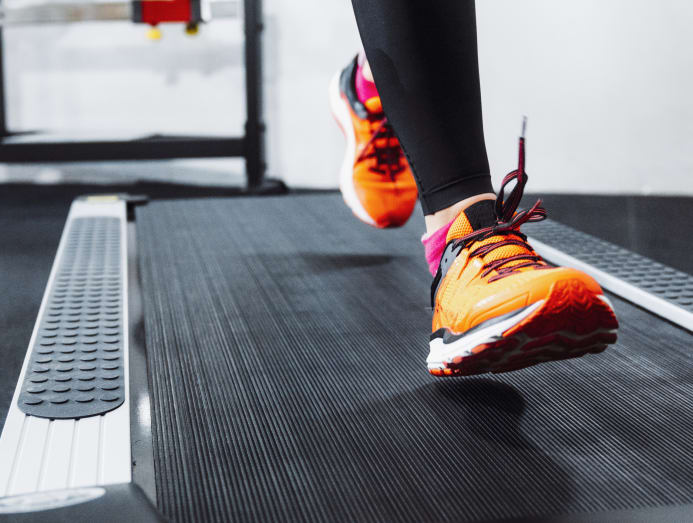Does exercising curb your appetite or make you overeat later?
Does being active make usa ravenous afterward and prone to eating more than than we maybe should? Or does it edgeless our appetites and make it easier for the states to skip that final, tempting slice of pie?
A new study provides timely, if cautionary, clues. The study, which involved overweight, sedentary men and women and several types of moderate exercise, found that people who worked out did non overeat after at an enticing cafe lunch.
Yet, they also did non skip dessert or skimp on portions. The findings offering a reminder during the holidays that while exercise has countless wellness benefits, helping united states of america swallow less or lose weight may not be among them.
For about of united states of america, practice affects our weight and hunger in unexpected and sometimes contradictory ways. Co-ordinate to multiple scientific studies, few people who outset to exercise driblet every bit many pounds as the number of calories they fire working out would foretell.
Some contempo research suggests this occurs because our bodies stubbornly try to hang on to our fat stores, an evolutionary adaptation that protects united states confronting (unlikely) future famines.
So, if nosotros burn calories during exercise, our bodies might nudge us to sit more afterward or reallocate energy from some bodily systems to others, reducing our overall daily energy expenditure.
In this way, our bodies unconsciously compensate for many of the calories we burn exercising, reducing our chances of dropping pounds by working out.
But that caloric compensation happens slowly, over the grade of weeks or months, and involves energy expenditure. It has been less clear whether and how do influences our energy intake – that is, how many servings of food nosotros eat – particularly in the hours immediately after a workout.
The evidence and then far has been mixed. Some studies indicate that exercise, particularly if it is strenuous and prolonged, tends to edgeless people's appetites, often for hours or into the next day.

This phenomenon prompts them to take in fewer calories at subsequent meals than they would had they not exercised. But other studies suggest the opposite, finding that some people feel hungrier after workouts of any kind, and soon replace the calories they expended – and then some – with an actress helping or two at their adjacent repast.
Many of those studies, though, relied on salubrious, fit and active young men and women every bit subjects, since those groups tend to be in ready supply amid students in exercise scientific discipline departments at universities.
Fewer experiments have looked at how practise might immediately touch on appetite and eating in older, overweight, sedentary adults, and even fewer have studied the effects of resistance training too every bit aerobic exercise.
THE FOCUS Grouping OF THE STUDY
The new study was published in October in Medicine & Science in Sports & Exercise. Scientists at the Academy of Utah in Salt Lake Urban center, the Academy of Colorado Anschutz Medical Campus in Aurora and other institutions advertised for volunteers in Colorado willing to do and eat, for the sake of science.

Winnowing hundreds of replies, they wound upwardly with 24 men and women, ranging in age from 18 to 55, who were overweight or obese and generally inactive. They invited everyone to visit the lab first thing in the morning, fed them breakfast, so, on separate days, had them sit down quietly, walk briskly on a treadmill or elevator weights for nigh 45 minutes.
Earlier, during and for iii hours later on, the researchers drew blood to check for changes in hormones related to appetite and asked people how hungry they felt.
They also let anybody help themselves to an open buffet luncheon of lasagna, salad, rolls, soda and poundcake with strawberries, while unobtrusively monitoring how much food people consumed.
Then the researchers compared hormones, hunger and bodily eating and establish odd disconnects.
RESEARCH FINDINGS
In general, people's hormones shifted after each practise session in ways that could be expected to reduce their appetites. But the study's participants did not report feeling less hungry – nor did they study feeling hungrier – later their workouts compared with when they had sat.
And at lunch, they ate nigh the same amount, about 950 calories worth of lasagna and the other buffet foods, whether they worked out or non.
The upshot of these results suggests that, at the very least, brisk walking or lite weight lifting may non affect our subsequent eating as much as "other factors," such as the scent and oozing gustatory delights of lasagna (or buttery rolls or pie), said Tanya Halliday, an assistant professor of health and kinesiology at the University of Utah, who led the new study.
People's appetite hormones may have dropped a fleck after their workouts, merely those drops did not have much effect on how much they ate afterward.
Nevertheless, practise burned some calories, she said – about 300 or and so each session. That was less than the virtually 1,000 calories the volunteers consumed on average at lunch, only hundreds more than than when they sabbatum. Over time, this departure might help with weight control, she said.
Of grade, the report has obvious limitations. It looked at a single session of moderate, brief practise by a couple dozen out-of-shape participants.
People who piece of work out regularly, or who do more than strenuous workouts, might respond differently. Researchers will demand to conduct more studies, including those with more various groups and those that take place over a longer time menstruation.
Just even now, the findings have a gentle, apple-pie allure. They suggest "people shouldn't be agape that if they exercise, they will overeat," Dr Halliday said.
And, she said, "Thanksgiving is just 1 day" and will not impact your weight in the long term.
So, consume what you desire at the banquet and enjoy. Dr Halliday besides recommended going for a walk or joining a Turkey Trot with your family and friends beforehand, if you can – non to blunt your appetite, but to boost your social bonds and to be thankful to exist moving frontwards together.
Past Gretchen Reynolds © The New York Times
This article originally appeared in The New York Times.
Source: https://cnalifestyle.channelnewsasia.com/wellness/exercise-weight-loss-overeating-290261
0 Response to "Does exercising curb your appetite or make you overeat later?"
ارسال یک نظر